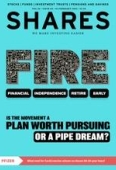Archived article
Please note that tax, investment, pension and ISA rules can change and the information and any views contained in this article may now be inaccurate.
Chinese stock market rocked by $330 billion Evergrande liquidation

China is once again in the spotlight after a Hong Kong high court pulled the plug on negotiations to save the world’s most indebted property developer China Evergrande (6666:HKG).
Shares in Evergrande were suspended at HK$0.16 and are unlikely to reopen again after a judge ruled ‘enough is enough’ and appointed liquidators to work through the company’s $333 billion of liabilities.
Most of the firm’s debt is owned by mainland Chinese companies, although around $20 billion is thought to be owned by offshore investors and there will a great deal of interest in how they are treated.
Evergrande was founded in 1996 and lent heavily on borrowing to fuel its growth, becoming the largest dollar-debt borrower among its peers and at one stage the country’s biggest developer by sales.
In 2020 it had a liquidity ‘scare’ and promised to halve its debt to $100 billion by 2023, but in 2021 it was late paying interest on some of its bonds and in December that year it missed payments altogether.
Negotiations have been ongoing ever since, and it was widely thought the Chinese government would eventually step in with some kind of bailout, so the decision to wind the company up will send reverberations through the economy.
Construction accounts for as much as 25% of Chinese GDP (gross domestic product), and Evergrande has tens of thousands of units either built but unoccupied or under development meaning the process of liquidating its assets will take years.
Considering the ongoing weakness of the housing market, a fire sale of assets is likely to depress prices even further and damage homebuyer confidence further, not to mention the knock-on effect on the rest of the quoted property sector.
As well as its real estate business, Evergrande owned a services company and an EV (electric vehicle) maker, which had yet to actually make any EVs, and both will likely have to be liquidated to pay creditors.
The Chinese authorities have already cut the reserve requirement for banks, to encourage them to lend, and promised stimulus measures to prop up the ailing economy which has yet to recover from the strict ‘zero-Covid’ restrictions applied during the pandemic.
This weak growth momentum has translated into a near-60% fall in the MSCI China index since early 2021, while Japan’s Nikkei index hits 34-year highs and the S&P 500 index hits new record highs.
Reports recently began circulating that state-owned companies would commit around $300 billion of offshore money to buy Chinese stocks listed in Hong Kong.
Now, the government has introduced a ban on short-selling in a further attempt to stop the stock market’s slide with further measures promised.
Important information:
These articles are provided by Shares magazine which is published by AJ Bell Media, a part of AJ Bell. Shares is not written by AJ Bell.
Shares is provided for your general information and use and is not a personal recommendation to invest. It is not intended to be relied upon by you in making or not making any investment decisions. The investments referred to in these articles will not be suitable for all investors. If in doubt please seek appropriate independent financial advice.
Investors acting on the information in these articles do so at their own risk and AJ Bell Media and its staff do not accept liability for losses suffered by investors as a result of their investment decisions.
Issue contents
Daniel Coatsworth
Editor's View
Education
Feature
Great Ideas
Investment Trusts
News
- Pfizer beats earnings expectations but still has a lot to do to recapture former glories
- Chinese stock market rocked by $330 billion Evergrande liquidation
- Why shares in fashion victim Superdry have slumped 50% year-to-date
- InterContinental Hotels continues to benefit from strong travel demand
- Luxury goliath LVMH shows resilience but Diageo serves up sobering results

 magazine
magazine








